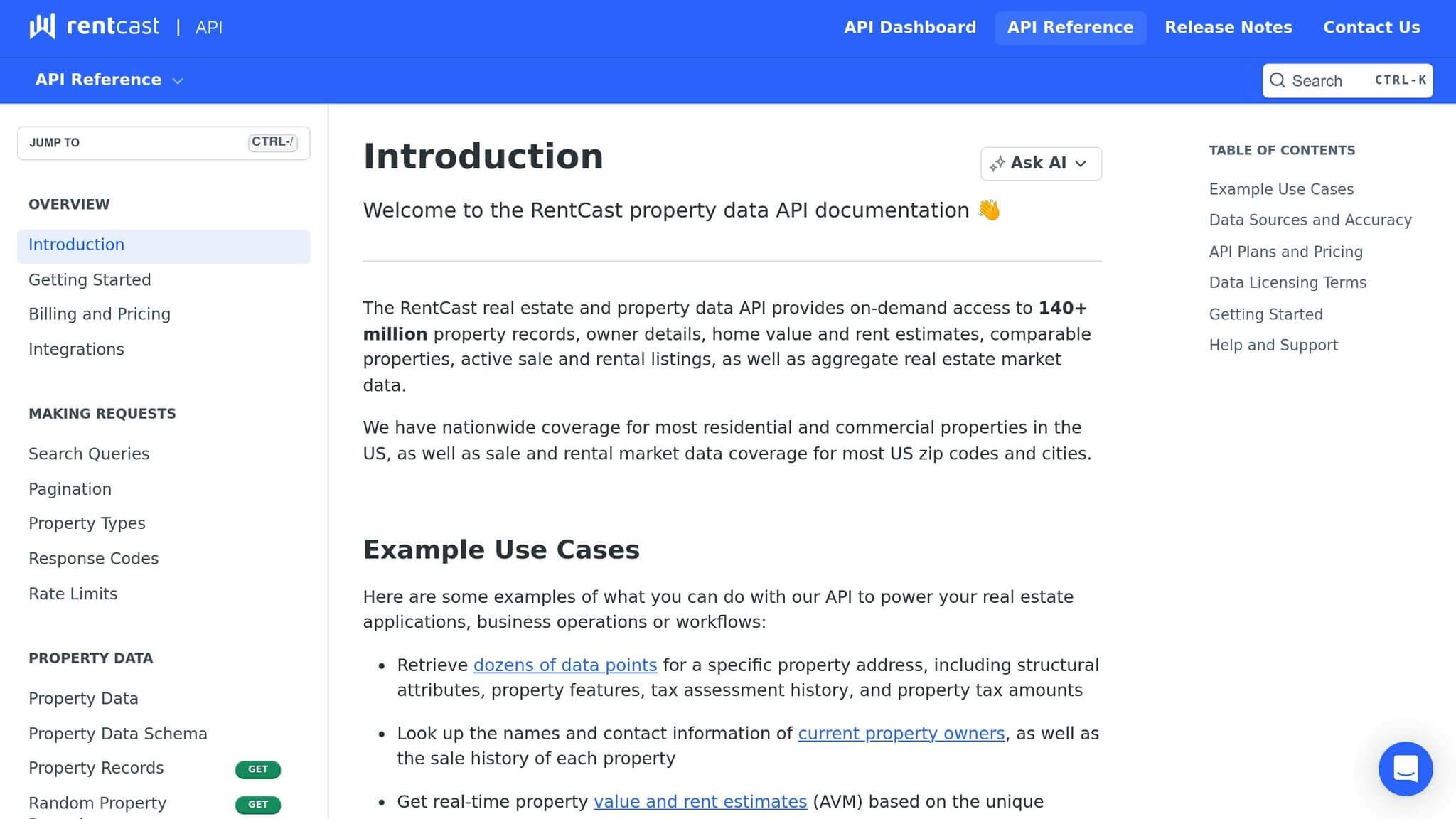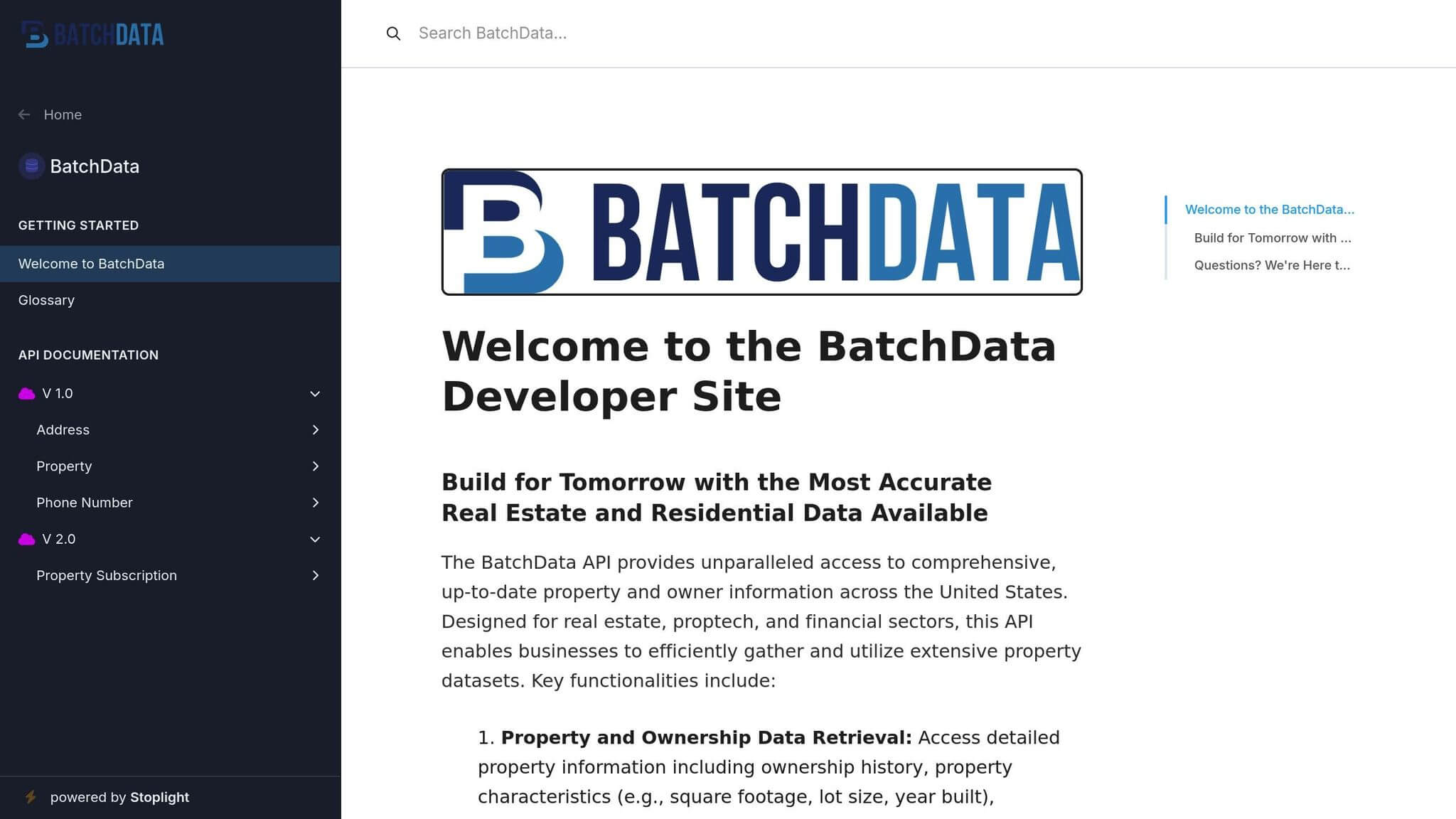Property Search APIs simplify real estate by connecting databases to tools like websites or apps. They deliver detailed property data, market trends, and analytics, helping professionals make informed decisions. Key features include:
- Comprehensive Property Data: Access property details, sales history, ownership records, and neighborhood stats in one place.
- Market Analytics: Analyze price trends, turnover rates, and investment potential.
- Integration: Automate workflows with CRM tools, batch searches, and real-time updates.
For example, BatchData API focuses on U.S. property data, offering flexible pricing and enriched features like contact details for property owners. Whether you’re an agent, broker, or investor, these APIs streamline property searches, valuation, and decision-making.
Key Takeaway: Property Search APIs save time, automate tasks, and provide actionable insights for real estate operations.
How to Get Property Records with RentCast API | Python Tutorial

Core Features of Property Search APIs
Property Search APIs are designed to provide extensive data access, actionable market insights, and smooth integration capabilities. Together, these features simplify property evaluations and enhance operational efficiency for real estate professionals.
Complete Property Data Access
These APIs go far beyond basic property listings. They deliver a treasure trove of detailed information, including physical attributes like square footage, lot size, number of bedrooms and bathrooms, and architectural styles. Sales history is another key feature, offering insights into past transaction dates, sale prices, and long-term market appreciation.
Ownership records are also included, revealing current and past owners, deed details, and the property’s transfer history. On top of that, neighborhood data such as school district boundaries, crime rates, walkability scores, and proximity to amenities like parks, shopping centers, and public transit are readily available.
By consolidating all this data into one platform, real estate professionals can create complete property profiles without having to pull information from multiple sources. This saves time and simplifies decision-making.
Market Data and Analytics
In addition to detailed property information, these APIs offer robust market analytics to support smarter decisions. Features include price trend analysis, property turnover rates, and comparative market analysis (CMA), which automatically identifies similar properties and recent sales for comparison.
Local market insights provide valuable economic data, such as average days on the market, price-per-square-foot trends, and seasonal buying patterns. This helps agents and brokers time listings strategically and set competitive prices. For investors, some APIs even calculate rental yields and cash flow projections based on current market conditions and historical data.
Integration and Scaling Options
Property Search APIs are built to handle high-volume transactions with ease. Features like batch property searches, automated updates, and seamless integration with existing tools – such as real estate software, CRM platforms, or custom applications – ensure smooth workflows.
Most APIs use RESTful endpoints with JSON responses, making them compatible with modern web and mobile applications. Developers benefit from comprehensive documentation, including code samples, API references, and sandbox environments for testing before deployment.
Flexible pricing models cater to businesses of all sizes, from solo agents conducting occasional searches to large brokerages managing thousands of queries daily. Many APIs also include webhook functionality, enabling real-time notifications for property data updates, so connected systems are always up to date.
How Property Search APIs Improve Real Estate Operations
Property Search APIs simplify complex tasks and provide actionable insights, helping real estate professionals work more efficiently and make smarter decisions. By automating searches, valuations, and workflows, these tools offer access to detailed property data that supports better outcomes.
Automated Property Search and Filtering
APIs make property searches faster and more precise by automatically identifying listings that meet specific criteria. Whether it’s price range, rental yield, or location, these systems filter through vast amounts of data and continuously monitor new listings, sending alerts when opportunities match the set parameters.
For investment firms, this means uncovering opportunities like distressed properties, foreclosures, or off-market deals that might otherwise go unnoticed. By analyzing ownership trends, tax records, and property conditions, APIs provide a systematic way to expand portfolios.
This automation doesn’t just save time – it allows real estate professionals to focus on building relationships with clients and negotiating deals while leaving the heavy lifting of data gathering to the technology.
Smarter Property Valuation and Analysis
APIs also streamline property valuation by automating comparative market analysis. They pull data from recent sales and key property features, eliminating the need for manual research. Additionally, market trend analysis tracks price changes, inventory levels, and regional activity, helping professionals identify areas poised for growth or shifts.
These tools go a step further by assessing risks, using local economic indicators and neighborhood trends to predict how property values might change. For investors, APIs can even estimate renovation costs by combining property condition data with contractor pricing, making them invaluable for evaluating potential projects.
By scoring investment opportunities based on factors like cash flow and market stability, APIs help investors quickly identify the most attractive prospects. This data-driven approach feeds seamlessly into workflows, making daily operations smoother and more efficient.
Seamless Integration and Workflow Automation
Property Search APIs act as a bridge, connecting various systems and automating workflows. For example, CRMs can automatically update with real-time property matches, market changes, and valuation updates. Marketing efforts also benefit, as data flows directly into email campaigns, social media tools, and ad platforms.
Even administrative tasks are simplified. APIs can generate documents, sync financial records like rent rolls and expenses, and update investment performance reports. Property listings across websites and mobile apps stay accurate through real-time synchronization.
sbb-itb-8058745
BatchData Property Search API: Features and Benefits

BatchData builds on its core API capabilities by offering specialized tools that simplify real estate operations. By combining detailed property data with contact enrichment, BatchData provides a comprehensive solution for U.S. real estate professionals.
BatchData API Key Features

BatchData’s property search API goes beyond basic listings to deliver enriched property data, giving users deeper insights. The platform also includes contact enrichment and skip tracing services, which connect property data with owner contact details. This allows investors and agents to identify property owners and access reliable contact information. Features like phone number and address verification help ensure the data is accurate, making outreach more efficient.
The platform supports bulk and custom datasets tailored to specific business needs, simplifying tasks like portfolio analysis and market research. For businesses with unique demands, BatchData provides custom data feeds with specialized enrichment processes.
Pricing and Custom Solutions
BatchData uses a Pay-As-You-Go pricing model, which means users only pay for the data they consume. This eliminates the need for monthly subscriptions, making it a cost-effective option for both occasional users and those with high-volume requirements. The scalable pricing ensures accessibility for teams of all sizes without the need for large upfront commitments.
For businesses with more specific needs, BatchData offers custom solutions with flexible pricing. These can include dedicated data pipelines, advanced enrichment processes, and consulting services to help integrate property data into existing software platforms and automation systems.
U.S. Market Focus and Data Standards
BatchData structures its property and contact data to align with U.S. standards, ensuring smooth integration for domestic users. Property values are displayed in dollars ($), addresses follow U.S. postal formats, and dates use the MM/DD/YYYY format. Measurements are provided in square feet for interiors and acres for land areas, with temperature data noted in Fahrenheit.
The platform exclusively focuses on U.S. property records, sourcing data from a broad range of public records across all 50 states to maintain accuracy and completeness.
Additionally, BatchData complies with U.S. data privacy regulations and industry standards, offering users peace of mind when incorporating its solutions into their workflows. These features make it easier to choose and implement the right API for any real estate operation.
How to Choose and Implement a Property Search API
When selecting a Property Search API, it’s essential to consider factors like data coverage, the richness of available fields, and access to historical records. These elements are critical for conducting accurate analyses and making informed decisions.
Key Factors to Evaluate
- Data Coverage: Choose an API that provides near-complete coverage, ideally encompassing at least 99% of properties across the U.S. This ensures you’re working with comprehensive data for most geographic areas.
- Field Density: Verify that the API offers essential property details consistently. Look for data points such as property values, square footage, lot dimensions, and ownership records to support a range of real estate needs.
- Historical Records: For understanding market trends and conducting comparative analyses, opt for an API with a solid historical database. A 5-10 year record of past property data can help you track appreciation trends and market cycles effectively.
Getting Started with Property Search APIs
Once you’re familiar with the features and advantages, the next step is diving into how to effectively use a Property Search API to boost your real estate operations. Tools like BatchData’s API make it possible for real estate professionals to access essential property data and expand their reach across the U.S. market.
Start by identifying the data you need most – like market values, ownership details, or property-specific metrics. Having a clear understanding of your priorities ensures you can make the most of the API right from the beginning.
Choose a pricing model that matches your usage patterns. For instance, BatchData offers a Pay-As-You-Go option, which is ideal for professionals dealing with seasonal shifts or those new to property data integration. This way, you only pay for the data you use, making it a cost-effective entry point.
Plan your technical setup carefully. Many Property Search APIs, including BatchData’s, come with detailed developer documentation and support. Start small by testing how the API integrates with your current systems. This step helps you pinpoint any technical hurdles early on and allows your team to familiarize themselves with the API’s functionality before scaling up.
Leverage professional services for complex needs. If your business requires custom datasets or tailored data workflows, BatchData offers consulting and support to simplify the integration process. These services can save time and help you hit the ground running with a solution designed for your specific requirements.
Prioritize data accuracy and coverage. In the U.S. real estate market, having reliable and up-to-date information is non-negotiable. BatchData’s focus on the American market ensures their data meets local standards and regulations, which is critical for making sound investment decisions or delivering trustworthy services to your clients.
Start small and grow over time. Begin with basic property searches to get a feel for the system, then gradually explore advanced features as your needs evolve. This step-by-step approach keeps costs manageable while helping you discover which tools offer the most value for your business.
FAQs
How do Property Search APIs save time and help real estate professionals make better decisions?
Property Search APIs make finding property details faster and easier by offering immediate access to comprehensive data, including listings, valuations, and market trends. This means less time spent on manual research and more time focusing on what matters.
With up-to-date and precise insights into property values and market conditions, these APIs enable real estate professionals to make informed decisions with confidence. Whether you’re assessing a property’s potential or diving into market analysis, these tools take the complexity out of the process, boosting productivity and simplifying real estate tasks.
What should I look for when selecting a Property Search API for my real estate business?
When selecting a Property Search API, focus on a few key factors to ensure you’re accessing reliable and current property data. Look for APIs that provide accurate data, broad coverage, and frequent updates – these elements are crucial for delivering precise property listings, valuations, and insights into market trends.
Equally important are features like simple integration, quick response times, and dependable system performance. These aspects help create a smooth experience for both your team and your users. Don’t overlook scalability either – opt for a solution that can adapt as your business grows.
Lastly, take a close look at customer support and pricing. The right API should fit your budget and offer responsive support to address any issues that come up. By weighing these factors carefully, you can simplify property searches and make smarter, data-driven decisions.
What are the advantages of BatchData’s usage-based pricing compared to traditional subscription plans?
BatchData’s usage-based pricing model gives businesses a flexible way to manage costs. Instead of locking into a fixed monthly or annual subscription, you only pay for what you actually use. This means your expenses adjust naturally with your business needs, whether you’re growing or scaling back.
For companies, this setup can translate to noticeable savings, especially during slower periods. Plus, it offers clear and predictable costs without the risk of overspending on features you don’t need. It’s a smart choice for businesses aiming to manage their budgets effectively while still having access to essential tools.



